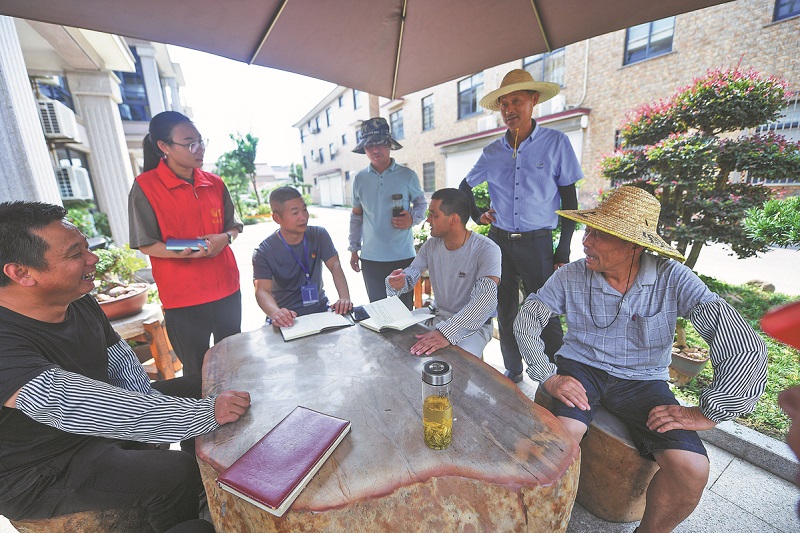Experts laud merits of China's democracy

Villagers, Communist Party of China members and cadres discuss village management arrangements in Longxi village, Huzhou, Zhejiang province, on July 21. XU YU/XINHUA
People-centered system vital to national success, observers say
Shanghai resident Zhu Guoping remembers Nov 2, 2019, well because that was the day top leader Xi Jinping explained the essence of socialist democracy in China to representatives of her community for the first time.
"We are marching along the road of political development of socialism with Chinese characteristics, and our people's democracy is a whole-process democracy," Xi told Chinese and foreign residents participating in a consultation workshop on draft laws during his inspection of a civic center in Hongqiao subdistrict.
Whole-process people's democracy is a system in which all key legislative decisions are made in accordance with procedures and through deliberations to make sure the decision-making system is sound and democratic, said Xi, general secretary of the Central Committee of the Communist Party of China.
Zhu serves as both a contact member for the civic center and as a local Party chief. That day she happened to shake hands with Xi three times, according to a web report by Xinmin Evening News.
"Once at his entrance, once upon departure, and then during my turn during his talk to the contact members," she told reporters. "The general secretary is really very friendly."
For years, the subdistrict's contact members, including retired teacher Xia Yunlong, have been collecting opinions and ideas on local and national affairs from residents and sending them to State authorities.
Xi told the members that their work is significant as it represents the way the people are masters of the country. Zhu said she thought Xi paved the way for their work, while Xia was reported to say that Xi's words touched their hearts, according to a People's Daily web report.
This kind of consultation is part of preparations for the National Congress of the CPC, which convenes once every five years. This year is the 20th Congress, and a new CPC Central Committee and CPC Central Commission for Discipline Inspection will be elected at the congress.
Power to the people
Whole-process people's democracy "is a unique model of governance", said Mustafa Hyder Sayed, executive director at the Pakistan-China Institute. "When you talk about China, we see that whole-process people's democracy has delivered."
Wilson Lee Flores, an economic-political analyst and honorary chairman of the Anvil Business Club in Manila, Philippines, describes China's progressive governance system as a "people's democracy with Chinese characteristics" as it is a system that aims to support economic and political policies by placing people at the center.
He said the system "directly consults with and truly represents the needs, voices and aspirations of the people", and it is "Confucian in moral values".
Between April 15 and May 16, with the help of media, Chinese internet users had the opportunity to participate in an initiative to solicit public opinions and suggestions ahead of the Party's 20th National Congress.
More than 8.54 million messages were collected, over 97 percent of which were submitted under real names. The participants came from various sections of society, including personnel from State organs and public institutions, employees of State-owned and private enterprises and self-employed individuals.
They spoke out on a wide range of topics, including full and strict Party governance, high-quality development, comprehensive reform and opening-up, whole-process people's democracy, law-based State governance, socialist cultural advancement and environmental progress.
By Sept 26, the Organization Department of the CPC Central Committee said in a statement that among the 2,296 delegates, 771 — or 33.6 percent — had been elected at the grassroots level, including 192 workers, 85 farmers and 266 professional and technical personnel.
Every effort has been made to ensure that the delegates elected to attend the CPC's 20th National Congress are broadly representative, and that the delegates include a proportion of members from the grassroots, it said.
"If we define democracy strictly in terms of decision-making that considers collective society," said Professor Eduardo Tzili-Apango, a researcher at Mexico's Autonomous Metropolitan University, "China then is totally a democracy."
- Top legislature schedules session for Wednesday
- China's top legislator meets with British PM
- China's top legislator holds talks with president of Senegalese National Assembly
- China's top legislator meets with Finnish PM
- Top legislator calls for advancing people's congress work in line with Party, State priorities



